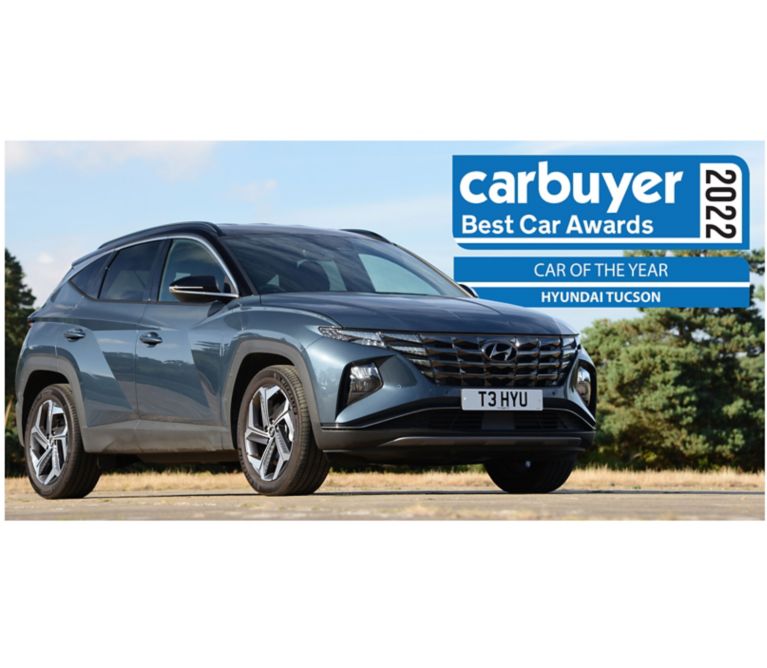- Hyundai TUCSON crowned ‘Car of the Year’ at 2022 Carbuyer Best Car Awards
- TUCSON also named ‘Best Family Car’ and ‘Best Hybrid’
- IONIQ 5 earns ‘Best Company Car’, ‘Best Family Electric Car’ accolades, with ‘Best Designed Car of the Year’, and ‘Motoring Innovation of the Year’ also awarded at the 2021 News UK Motor Awards
- i20 N recognised as ‘Best Hot Hatchback’ for 2022
Press material
-
Download
-
Images
Hyundai Motor collected eight awards across three models at the 2022 Carbuyer Best Car Awards and the 2021 News UK Motor Awards.
The accolades include the all-new Hyundai TUCSON being named ‘Car of the Year’ by Carbuyer. In addition to the prestigious title, TUCSON was also recognised as the ‘Best Family Car’ and ‘Best Hybrid Car’.
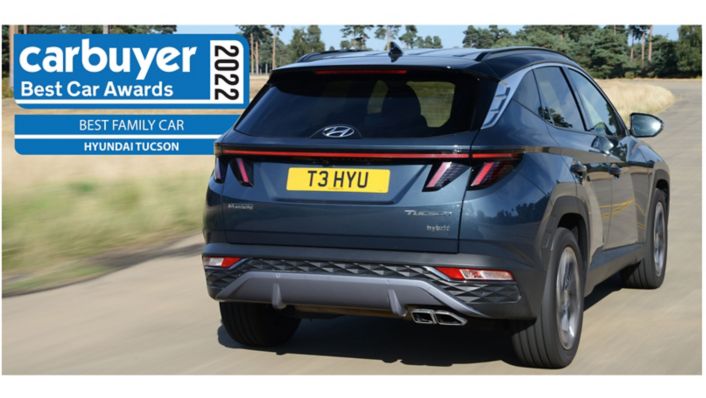
A range of features and highlights contributed to the Hyundai TUCSON winning three titles. The compact SUV is available with the widest range of electrified powertrains in its segment, including hybrid, plug-in hybrid, and gasoline with 48-volt mild hybrid options. It sports a sophisticated yet rugged design and effortlessly blends performance and efficiency. Additionally, TUCSON’s best-in-class safety features, such as Forward Collision-Avoidance Assist (FCA) and Blind-spot Collision-avoidance Assist (BCA), support its engaging driving experience.
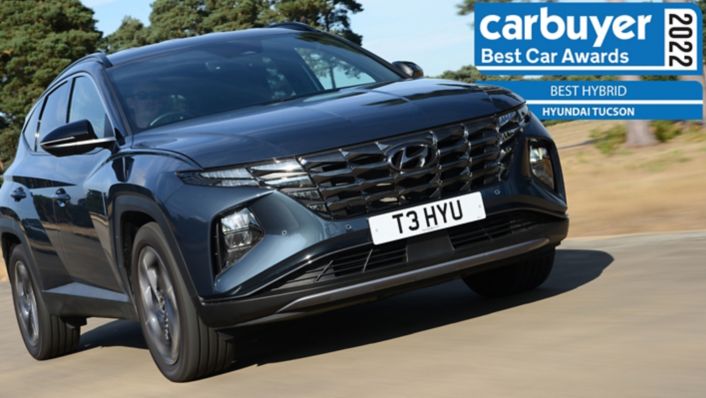
A multiple award winner, the Hyundai TUCSON is both Carbuyer’s Best Family Car as well as our Best Hybrid Car for 2022. Lovely to drive, practical, and easy to live with, it’s also cheap to run thanks to its hybrid powertrains. The new TUCSON is quite simply the best new car we’ve driven all year – making it the natural winner of Carbuyer’s overall Car of the Year.
The 2022 Carbuyer Best Car Awards also honoured the Hyundai i20 N as the ‘Best Hot Hatchback’ and the fully electric Hyundai IONIQ 5 as the ‘Best Company Car’ and ‘Best Family Electric Car’.
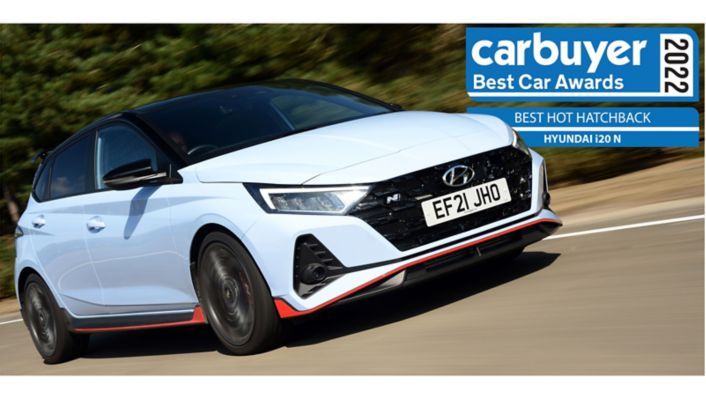
We’ve seen the electric car game move on significantly over the past 12 months, and the IONIQ 5 is proof of just how far the market has come. Futuristic not only in the way it looks but its long range and ultra-rapid charging also put it at the cutting-edge, while its spacious cabin and generous kit list make it a brilliant car to live with.
Carbuyer’s team of experts rigorously tested each model and judged the winners against their rivals on the market in terms of cost, performance, comfort, safety, and practicality.
British motoring journalists cast their votes
On top of this, at the 2021 News UK Motor Awards, IONIQ 5 also won the titles of ‘Best Designed Car of the Year’ – beating out the Aston Martin V12 Speedster and Maserati MC20 – and ‘Motoring Innovation of the Year’ – thanks to its relaxation seats and Vehicle-to-Load (V2L) technology.
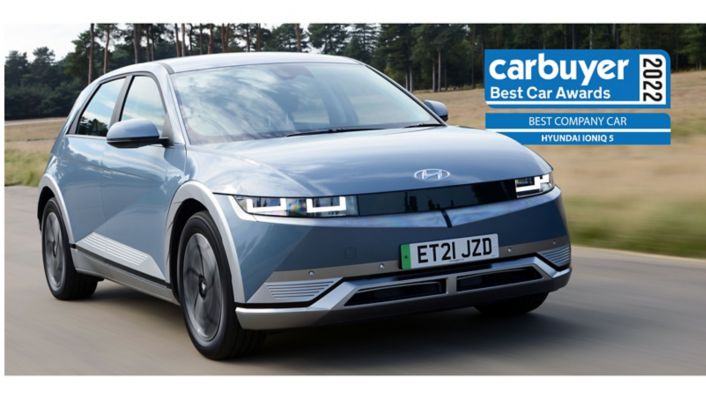
The IONIQ 5's exterior design is what catches your attention immediately, but it’s the innovation inside that really impresses. Many carmakers talk about creating ‘lounge-style cabins’ in their new cars, but Hyundai is the first to truly explore that concept in a production car, with super-comfortable reclining seats that allow next-level relaxation during breaks from driving. And the Vehicle-to-Load technology turns IONIQ 5 into a power bank on wheels, which opens up all sorts of outdoor activity possibilities, from charging e-bikes to powering lights and appliances while camping. Both innovations that other carmakers are bound to follow in the near future.
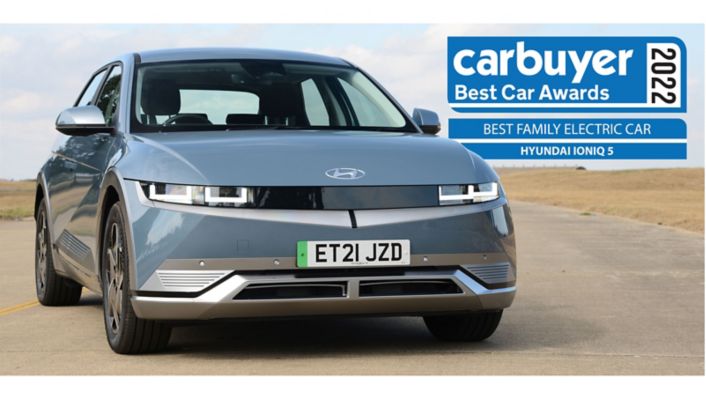
These awards were judged by an expert panel of motoring journalists from Driving.co.uk, The Sunday Times, The Sun, and the magazine The Times LUXX.
The awards confirm that the latest-generation of our models are leading in the European car market. Especially our electrified models are most advanced and support our strong growth. Also our N sub-brand became an established player in its segments.
Disclaimer: CO2 and emissions data
- Fuel consumption combined for the Hyundai TUCSON 1.6 T-GDI 48V (150 PS) with 6iMT 2WD in l/100 km: 6.8 - 6.5; CO2 emissions combined in g/km: 154 - 147 (WLTP)
- Fuel consumption combined for the Hyundai TUCSON 1.6 T-GDI 48V (150 PS) with 7DCT 2WD in l/100 km: 6.6 - 6.3; CO2 emissions combined in g/km: 150 - 143 (WLTP)
- Fuel consumption combined for the Hyundai TUCSON 1.6 T-GDI 48V (180 PS) with 6iMT 2WD in l/100 km: 6.7 - 6.4; CO2 emissions combined in g/km: 152 - 145 (WLTP)
- Fuel consumption combined for the Hyundai TUCSON 1.6 T-GDI 48V (180 PS) with 7DCT 4WD in l/100 km: 7.1 - 6.9; CO2 emissions combined in g/km: 162 - 156 (WLTP)
- Fuel consumption combined for the Hyundai TUCSON 1.6 CRDi 48V (136 PS) with 6iMT 2WD in l/100 km: 5.3 - 5.0; CO2 emissions combined in g/km: 140 - 130 (WLTP)
- Fuel consumption combined for the Hyundai TUCSON 1.6 CRDi 48V (136 PS) with 7DCT 2WD in l/100 km: 5.6 - 5.2; CO2 emissions combined in g/km: 146 - 137 (WLTP)
- Fuel consumption combined for the Hyundai TUCSON 1.6 CRDi 48V (136 PS) with 7DCT 4WD in l/100 km: 6.0 - 5.7; CO2 emissions combined in g/km: 158 - 149 (WLTP)
- Fuel consumption combined for the Hyundai TUCSON 1.6 T-GDI (150 PS) with 6MT 2WD in l/100 km: 7.0 - 6.6; CO2 emissions combined in g/km: 159 - 150 (WLTP)
- Fuel consumption combined for the Hyundai TUCSON 1.6 T-GDI (150 PS) with 6MT 4WD in l/100 km: 7.8 - 7.3; CO2 emissions combined in g/km: 178 - 165 (WLTP)
- Fuel consumption combined for the Hyundai TUCSON 1.6 CRDi (115 PS) with 6MT 2WD in l/100 km: 5.6 - 5.2; CO2 emissions combined in g/km: 146 - 137 (WLTP)
- Fuel consumption combined for the Hyundai TUCSON 1.6 T-GDI Hybrid with 6AT 2WD in l/100 km: 5.9 - 5.5; CO2 emissions combined in g/km: 135 - 125 (WLTP)
- Fuel consumption combined for the Hyundai TUCSON 1.6 T-GDI Hybrid with 6AT 4WD in l/100 km: 6.6 - 6.2; CO2 emissions combined in g/km: 149 - 140 (WLTP)
- Fuel consumption combined for the Hyundai TUCSON 1.6 T-GDI Plug-in Hybrid with 6AT 4WD in l/100 km: 1.4; CO2 emissions combined in g/km: 31 (WLTP)
- Electricity consumption combined for the Hyundai IONIQ 5 58 kWh with 2WD in kWh/100 km: 16.7; CO2 emissions combined in g/km: 0 (WLTP)
- Electricity consumption combined for the Hyundai IONIQ 5 58 kWh with 4WD in kWh/100 km: 18.1; CO2 emissions combined in g/km: 0 (WLTP)
- Electricity consumption combined for the Hyundai IONIQ 5 72.6 kWh (19” alloy rims) with 2WD in kWh/100 km: 16.8; CO2 emissions combined in g/km: 0 (WLTP)
- Electricity consumption combined for the Hyundai IONIQ 5 72.6 kWh (20” alloy rims) with 2WD in kWh/100 km: 17.9; CO2 emissions combined in g/km: 0 (WLTP)
- Electricity consumption combined for the Hyundai IONIQ 5 72.6 kWh (19” alloy rims) with 4WD in kWh/100 km: 17.7; CO2 emissions combined in g/km: 0 (WLTP)
- Electricity consumption combined for the Hyundai IONIQ 5 72.6 kWh (20” alloy rims) with 4WD in kWh/100 km: 19.0; CO2 emissions combined in g/km: 0 (WLTP)
- Fuel consumption combined for the Hyundai i20 N 1.6 T-GDI (204 PS) with 6MT in l/100 km: 6.9; CO2 emissions combined in g/km: 158 (WLTP)

